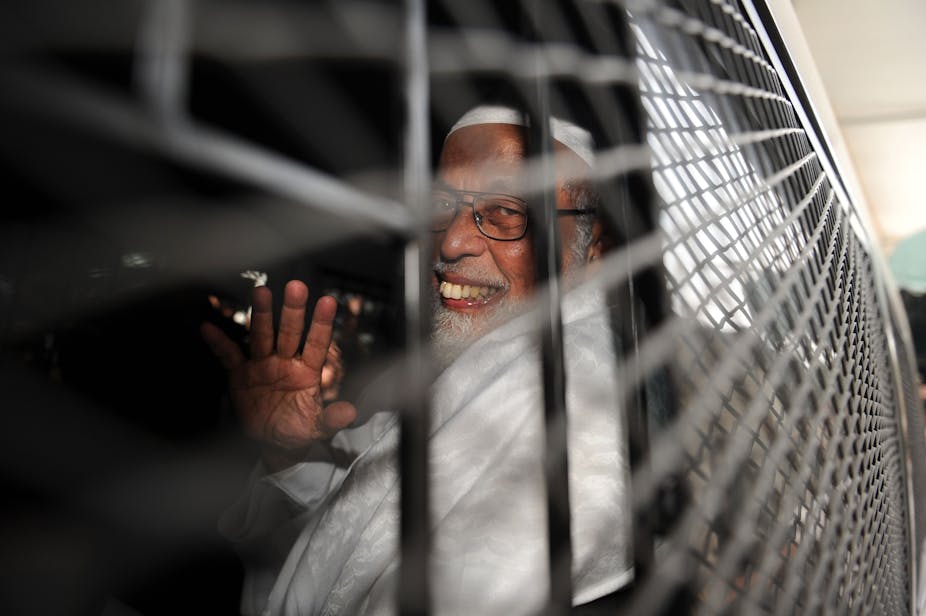Radical Indonesian Muslim cleric Abu Bakar Bashir was yesterday sentenced to 15 years in jail for supporting and sponsoring terrorism.
RMIT Associate Professor Jeff Lewis, an Indonesia expert, tells The Conversation why it has been very difficult for the authorities to convict the man associated with terrorist group Jemaah Islamiyah responsible for the Bali bombings.
Why was Bakar sentenced to prison and not death, which happened to other Indonesia terrorists like Amrozi?
The actual charges he was facing didn’t relate to acts of terror. It was charge of supporting and sponsoring terrorism. That doesn’t attract the death penalty. The maximum sentence as I understand it would have been life and he got 15 years.
The prosecution were only seeking a life sentence. There were seven charges and he was only found guilty of one of them which was sponsoring terrorism.
What has been the reaction in Indonesia?
Indonesia is a very mixed and complex place. There were images on the news of Bakar Bashir’s supporters ranting and being angry and expressing their disapproval at the sentence, but by and large I think most Indonesians are much more moderate and reasonably comfortable with the result.
Is this a watershed moment? Does it mark the end for Jemaah Islamiyah (JI) and Islamist terror in Indonesia?
Yes and no. Bakar Bashir does have a particular status among terrorist groups. JI itself is pretty fragmented and probably doesn’t even exist as a unified organisation anymore. But Bakar Bashir was the person, along with Abudullah Sungkar, who established JI in the late 70s and 80s.
It is sort of significant for JI but in terms of the broader terrorism issues in Indonesia it probably doesn’t mean a huge amount. We have to keep in mind that there are two types of Islamist purists in Indonesia.
There are those who are militant and there are those who are non-militant and for the militants Bakar Bashir remains something of symbol, something of a religious figurehead. But by and large he is not particularly relevant for any kind of organisational attacks that may take place.
Why does a man who has been involved with groups that have killed dozens of people at Bali and so on only get 15 years but young and naïve Australians are sentenced to death or life in prison for drug smuggling?
I understand why Australians would think that. I have a personal relationship with the Bali Nine and Schapelle Corby. I go into prison and I visit. I certainly feel that their sentences were excessive. I don’t think there can be any doubt about that.
Having said that it has been very difficult to sustain the charges against Bakar Bashir for a range of reasons and I understand why people would think 15 years is disproportionate. But when you look at the actual charges they managed to stick on Bashir and you look at the trial process, and the way the trials were prosecuted I can understand why [we arrived at] 15 years.
I actually think 15 years is a pretty good result. When you look at the case for conspiracy over the Bali bombings as I have, you can see that Bakar Bashir wasn’t actually directly responsible for those bombings, it was another person called Hambali. Bakar Bashir was not necessarily even supportive of that attack, it is quite ambiguous.
Is that why Bashir was never picked up by the Americans and put in Guantanamo Bay?
That is where Hambali is and Hambali was the major planner and warrior. Bakar Bashir was certainly involved with JI and certainly part of those discussions and I don’t have any doubt about that and that is why he was charged with conspiracy.
But in my reading of it, Bakar Bashir was actually opposed to the Bali attack, not on any humane reasons, but purely and simply for strategic reasons. He simply didn’t think it was a good idea and that is why he only got charged with conspiracy.

